Do you enjoy spending time on your boat? There’s truly nothing like skimming across the water in a speedboat or relaxing on the waves in a pontoon… However, here’s the part where it gets iffy. Do you enjoy the environmental impact that your boat has? What about the hassle of constantly refueling your boat?
Or, if all else fails, do you enjoy getting stranded on the water in your boat?
Yeah, we didn’t think so.
If you want to spend time on the water without worrying about your environmental impact or whether you’ll run out of juice, make sure your boat is equipped with the latest in solar technology. Hooking a solar panel up to your boat is a game-changer; in fact, many newer boats come equipped with solar panels straight from the manufacturer, showing that solar is truly the future of boating.
Before you start shopping for solar panels, you need to do your research and make sure you’re picking the right fit for your boat. Keep reading to learn the ins and outs of solar panels for boats and how you can get the most out of your investment.

Benefits of Using Solar Panels on Boats
Hooking solar panels up to your boat will make your boating more enjoyable in more ways than one. Here are some of the biggest benefits to installing solar panels onto your boat:
- Reduce noise pollution: Solar panels don’t make any noise, which is a huge plus if you’re trying to enjoy the tranquility of being out on the water. You can say goodbye to the noise and smell of a gas generator.
- Low maintenance: Since there are no moving parts that can break or wear out over time, solar panels are fairly low maintenance; you won’t have to worry about replacing or repairing them very often.
- Cost-efficient: Sitting idle, but you don’t want to turn off the radio? With solar panels, you can use less gas while still keeping your lights, radio, navigation, and more powered. No need to keep the engine running and burn through expensive gas.
- Environmentally friendly: One of the best things about solar panels is that they’re eco-friendly. They don’t produce any emissions or other pollutants, making them an excellent option for boaters who want to reduce their impact on the planet.
Solar Panel Placement
There are a few different places you can hook up solar panels to your boat. The most popular is the roof of the cabin as this provides the most significant amount of sun exposure. Other areas include along the gunwales, or on an arch over the back of the boat. Just remember: the more sun exposure your panels have, the more power they’ll generate, so keep them somewhere sunny!
Solar panels can be placed on any size boat, from small sailboats to large yachts. How many you need and the cost will depend on the size of your boat. Here are the standard solar panel sizes and the kinds of boats they’re typically seen on:
- 50-watt solar panels: These are the smallest solar panels for boats. They can be used to power small accessories like radios and lights. You’ll often see them placed on kayaks or canoes.
- 100-watt solar panels: These panels can be used to power more accessories or even small appliances. They’re often seen on sailboats, catamarans, and motorboats.
- 200-watt solar panels: These are the largest standard-size solar panels for boats. They can be used to power large appliances or multiple smaller ones at the same time. These will keep your lights lit, your radio playing, and your boat’s battery charged.

Types of Solar Panels and How Long They Can Power a Boat
Before you get ahead of yourself planning your panel placement, make sure you’re picking the right kind of solar panel for the job. Your panels’ longevity largely depends on the kind you install. We’ll give you a quick breakdown of your most common options:
Amorphous Solar Panels
While amorphous solar panels have a worse energy conversion efficiency than other types of panels, they have some other benefits that other varieties can’t offer. As the name suggests, amorphous panels can be installed on curved surfaces. They also perform well in dim environments, making them a great choice for late-night boaters. Amorphous solar panels usually have a lifespan of 10 – 15 years.
Polycrystalline Solar Panels
Polycrystalline solar panels are made up of many silicon nanoparticles.They’re highly effective in energy conversion, but they’re weaker than monocrystalline solar panels. Their energy conversion rate makes them more expensive than amorphous solar panels, but their weakness makes them less expensive than monocrystalline solar panels, making them a good mid-range option. Polycrystalline solar panels can last up to 25 years.
Monocrystalline Solar Panels
Monocrystalline solar panels, as the name implies, are constructed of single crystals of silicon. They’re frequently regarded as the greatest since they can convert energy the most efficiently and last the longest, with a lifespan of up to 30 years. However, as mentioned before, they’re more expensive than polycrystalline solar panels.
Maintenance and Care for Solar Panels on Boats
Alright, you’re finally ready to pick out solar panels for your boat! Just make sure you’re up to the maintenance tasks they require so you’ll get as much value as possible out of your investment. Below are some steps you’ll need to take to maintain your boat’s new power source.
- Keep them clean and dust-free: Over time, dust, salt, and bird droppings can build up on solar panels and prevent them from working as efficiently as possible. Regularly cleaning your panels with soap and water will keep them in top condition.
- Check the connections: The connections between the solar panels and the electrical system on your boat can loosen over time. Periodically checking the connections and tightening them if necessary will keep the power flowing smoothly so you can relax without worries.
- Be mindful of shading: If part of your solar panel is shaded, it can significantly reduce its output. Therefore, it’s important to position the panels in a way that minimizes shading from things like trees, masts, and other boats.
Final Words
So there you have it! Now that you know the how and the why of installing solar panels on your boat, you can get to the when and the where. Feel free to check back here as you choose your panels to make sure you’re making a good call for your boat. Have any questions about solar panels? Reach out to the experts at Atlasta Solar; we’re always happy to help!
